初中英语教师教育故事2篇
教育叙事案例英语老师(2篇)
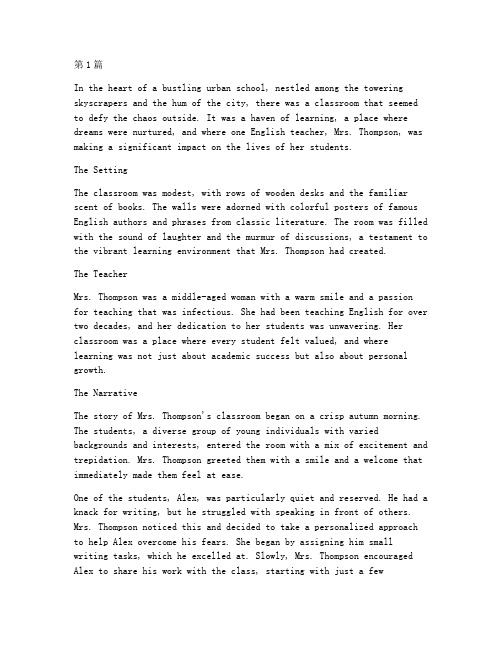
第1篇In the heart of a bustling urban school, nestled among the towering skyscrapers and the hum of the city, there was a classroom that seemed to defy the chaos outside. It was a haven of learning, a place where dreams were nurtured, and where one English teacher, Mrs. Thompson, was making a significant impact on the lives of her students.The SettingThe classroom was modest, with rows of wooden desks and the familiar scent of books. The walls were adorned with colorful posters of famous English authors and phrases from classic literature. The room was filled with the sound of laughter and the murmur of discussions, a testament to the vibrant learning environment that Mrs. Thompson had created.The TeacherMrs. Thompson was a middle-aged woman with a warm smile and a passionfor teaching that was infectious. She had been teaching English for over two decades, and her dedication to her students was unwavering. Her classroom was a place where every student felt valued, and where learning was not just about academic success but also about personal growth.The NarrativeThe story of Mrs. Thompson's classroom began on a crisp autumn morning. The students, a diverse group of young individuals with varied backgrounds and interests, entered the room with a mix of excitement and trepidation. Mrs. Thompson greeted them with a smile and a welcome that immediately made them feel at ease.One of the students, Alex, was particularly quiet and reserved. He had a knack for writing, but he struggled with speaking in front of others. Mrs. Thompson noticed this and decided to take a personalized approach to help Alex overcome his fears. She began by assigning him smallwriting tasks, which he excelled at. Slowly, Mrs. Thompson encouraged Alex to share his work with the class, starting with just a fewsentences at a time. With each success, Alex's confidence grew, and his voice began to resonate more loudly in the classroom.Another student, Maria, was a visual learner. Traditional teaching methods often left her feeling disconnected from the material. Mrs. Thompson recognized this and started incorporating more visual aids into her lessons. She used diagrams, videos, and interactive whiteboards to make complex concepts more accessible to Maria. This not only helped Maria but also made the lessons more engaging for the entire class.One day, the class was studying Shakespeare's "Romeo and Juliet." Mrs. Thompson knew that many students found the language and themes of the play challenging. Instead of simply reading through the play, she decided to bring the story to life. She organized a Shakespearean play, allowing students to take on roles and perform scenes from the play. The excitement in the classroom was palpable as students prepared for the performance. The day of the play arrived, and the school hall was filled with the sound of a live performance. The students were not just actors but also directors, set designers, and stage managers. The experience was transformative for everyone involved, and it brought Shakespeare's timeless story to life in a way that no textbook could.As the year progressed, Mrs. Thompson's classroom became a place where students not only learned English but also learned about themselves. They discovered their strengths, faced their fears, and grew as individuals. Mrs. Thompson's teaching style was not just about imparting knowledge but about fostering a love for learning and a sense of community.The ImpactThe impact of Mrs. Thompson's teaching extended beyond the classroom. Students who had once struggled with English found their voices and gained confidence. They began to see the value of literature and the power of language. Alex, who had once been too shy to speak, delivered a powerful monologue in the school play. Maria, who had previously avoided group work, became an active participant in class discussions.The success of Mrs. Thompson's approach was not limited to individual students. The class as a whole demonstrated significant improvement in their understanding of English literature and their writing skills. Mrs. Thompson's passion for teaching had created a ripple effect that touched every student in the room.ConclusionThe case of Mrs. Thompson, the English teacher, is a powerful testament to the transformative power of education. Her commitment to her students, her innovative teaching methods, and her ability to create a supportive and inclusive learning environment are qualities that any educator would do well to emulate. In a world that is ever-changing, Mrs. Thompson's classroom stands as a beacon of hope, a place where students can dream, grow, and learn.第2篇In the heart of a bustling urban school, there exists a classroom where the world of words and sentences come alive. This is the classroom of Mrs. Johnson, an English teacher with a passion for literature and a heart full of compassion. This narrative explores the transformative journey of a student, Alex, and the profound impact Mrs. Johnson's dedication and innovative teaching methods had on his learning experience.BackgroundAlex, a 14-year-old boy, entered Mrs. Johnson's English class with a mixture of apprehension and curiosity. He had struggled with English for years, often feeling disconnected from the subject matter. His previous teachers had used a traditional, teacher-centered approach, where the focus was on rote memorization and passive learning. Alex's grades in English were consistently below average, and he had begun to dread the weekly classes.The First EncounterOn the first day of the semester, Mrs. Johnson greeted her students with a warm smile and an open mind. She introduced herself and her expectations for the course, emphasizing the importance of critical thinking and creative expression. Instead of launching into atraditional lesson, she asked her students to share their favorite books and why they enjoyed them. Alex, initially hesitant, found himself sharing about a science fiction novel that had captured his imagination.Mrs. Johnson listened intently, nodding and encouraging each student. She then announced that the course would be a journey through various genres of literature, with a focus on how authors use language to convey emotions, ideas, and experiences. She promised that each student would have the opportunity to explore texts that resonated with them personally.The Transformative ProcessAs the semester progressed, Mrs. Johnson's approach began to have a profound effect on Alex. She encouraged active learning by creating a classroom environment that was both supportive and challenging. Here are some key moments that illustrate the transformative process:1. Personalized Learning: Mrs. Johnson recognized that each student had unique strengths and weaknesses. She tailored her lessons to accommodate different learning styles, allowing Alex to engage with the material in ways that were meaningful to him. For instance, she provided him with additional resources on grammar and vocabulary, helping him build asolid foundation.2. Interactive Discussions: Mrs. Johnson facilitated lively class discussions, where students were encouraged to express their opinions and ask questions. Alex found himself participating more actively, not only because he was interested in the texts but also because he felt valued and respected in the classroom.3. Creative Assignments: Instead of traditional essays and quizzes, Mrs. Johnson assigned creative projects that allowed students to express themselves in different ways. Alex thrived on these assignments, writingpoetry inspired by the characters and themes of the books they studied. His writing improved significantly, and he began to take pride in his work.4. Peer Collaboration: Mrs. Johnson encouraged peer collaboration, which helped Alex to learn from his classmates and feel less isolated. He developed strong relationships with his peers, and together, they supported each other in their learning journey.5. Reflective Writing: At the end of each unit, Mrs. Johnson had students write reflective essays on the texts they had studied. This practice allowed Alex to connect the literature to his own life experiences, fostering a deeper understanding and appreciation of the material.The OutcomeBy the end of the semester, Alex's transformation was evident. His grades in English soared, and he developed a genuine love for the subject. He no longer dreaded English class but looked forward to it, eager to engage with new texts and share his thoughts with his classmates. Mrs. Johnson's innovative teaching methods had not only improved Alex's academic performance but also instilled in him alifelong love of reading and writing.ReflectionMrs. Johnson's story serves as a powerful reminder of the impact that dedicated teachers can have on their students. By adopting a student-centered approach, she was able to tap into Alex's interests and strengths, transforming his learning experience from a source of dread to a source of joy. This case study highlights the importance of personalized learning, interactive discussions, creative assignments, peer collaboration, and reflective writing in fostering a love for learning.In conclusion, Mrs. Johnson's dedication and innovative teaching methods played a crucial role in Alex's educational journey. Her approach not only improved his academic performance but also instilled in him apassion for literature that would undoubtedly serve him well in the future. This narrative is a testament to the power of education and the transformative potential of a caring and dedicated teacher.。
英语教学故事(精选5篇)

英语教学故事(精选5篇)第一篇:英语教学故事孩子,我愿与你风雨同行“于老师,现在好吗?我终于拿到了本科文凭了,现在已经找好工作了。
”“老师,你要多注意身体,现在的孩子不好管,你别跟他们真生气啊。
”这些朴实而温暖的话语来自我从前的一个学生——小婷。
分别十几年,我和这孩子始终保持着联络。
她视我为师亦为友,遇到什么事都要和我讲。
每次收到她的信息,我都会想起和小婷十几年前一起走过的日子,那些有笑有泪的日子。
2003年秋季,我带的班级刚升入初二。
一天,主任给我送来了一个新学生,她便是小婷,来自本溪农村的一个女孩。
她穿着朴素,说话带着明显的口音。
一说话,班里有几个“淘气包”便发出了哄笑。
我留意到了这个苗头,担心同学们对小婷不友好,便特意叮嘱大家多关心照顾新同学。
刚开始几天,我经常跟小婷谈心,问她学习上有没有什么困难,有没有同学欺负她。
小婷微笑着说:“挺好的,谢谢老师对我的照顾。
”看见她脸上的快乐,我觉得很欣慰。
小婷成绩虽然一般,但学习刻苦,很有上进心。
由于基础不好,她总得比别的同学多用心。
上课没听懂的,下课就常常问老师。
因为她的努力,我经常表扬她,但每次她都觉得很不安。
过后,她曾找到我,说:“老师,我已经很努力了,成绩咋还没有提高呢?”我对她说:“不要有负担,只要全力以赴,就无怨无悔。
坚持不懈地努力,一定会成功的。
”小婷认真地听着,点了点头。
一晃几个月过去了,小婷来我们班快半年了。
有一天,这孩子早晨没来上学,一直到下午都没有消息。
快要下班的时候,忽然有人捎信说,小婷家里出事了,她的妈妈在车祸中遇难了。
我的心头一惊,对孩子来说,这无异于晴天霹雳啊!我思绪繁乱,心里想着孩子是怎样的悲痛与无助!下了班,我让学生带路,直奔小婷家。
小婷没在家,家里只有她姥姥一人。
老人家神情哀痛,告诉我说,小婷的妈妈在沈阳环卫当临时工,刚工作几个月,就遭此横祸。
现在,孩子和她的父亲都在沈阳料理后事。
家里条件很不好,好容易从老家搬出来,却又出了这样的事……我听完,心里十分酸楚:可怜的小婷,命运对她来说太残酷了!刚刚适应了新的学习生活,又遭遇失亲之痛!回到家后,我的心情久久不能平静。
初中英语教育叙事案例范文

初中英语教育叙事案例范文在初中时期,我对英语学习产生了浓厚的兴趣。
当时,我们的英语老师是一位年轻有活力的女老师。
她总是充满激情地讲课,让我们对英语的学习充满了热情。
记得有一次,我们正在学习动词时态。
我对于英语的动词时态一直感到头疼,总是弄不清楚各种时态的用法。
老师看出了我的困惑,决定给我一些额外的辅导。
她耐心地为我讲解每一种时态的用法,并提供了大量的例句让我练习。
在她的帮助下,我逐渐掌握了动词时态的使用方法,不再感到困惑。
另外一个让我印象深刻的经历是我们班举办的英语演讲比赛。
我一直梦想着能站在舞台上自信地演讲,但是却总是胆怯。
老师发现了我的愿望,鼓励我参加比赛。
她为我提供了各种资源和指导,帮助我准备演讲稿,让我练习演讲。
在这个过程中,她不仅教会了我如何表达自己,还教会了我如何克服困难,勇敢面对挑战。
最终,在老师的鼓励和指导下,我成功地参加了比赛并取得了不错的成绩。
这次经历让我深深地感受到了英语学习的乐趣和成就感,也让我对自己的能力更加自信。
老师的耐心和支持让我在英语学习中取得了不小的进步,也让我明白了学习的重要性和积极性。
通过这些教育案例,我体会到了教育的力量。
一位好的老师不仅能够传授知识,还能够激发学生的学习兴趣,引导他们走向知识的海洋。
初中时期那位充满激情的英语老师让我对英语学习产生了热爱,也让我明白了学习的意义。
在她的帮助和鼓励下,我度过了一段充实而愉快的英语学习时光。
教育,是一种无声的力量,它能够改变一个人的命运,引导他们走向成功。
初中时期那段关于英语教育的叙事经历,将会一直留在我的心中,激励我不断努力学习,追求更好的自己。
感恩于那位充满激情和耐心的英语老师,她让我懂得了学习的真谛,也启迪了我对未来的向往和期待。
英语教育叙事故事(5篇范例)
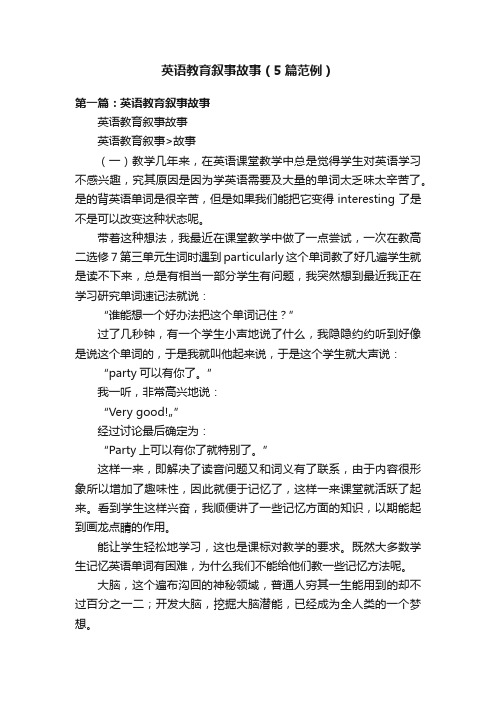
英语教育叙事故事(5篇范例)第一篇:英语教育叙事故事英语教育叙事故事英语教育叙事>故事(一)教学几年来,在英语课堂教学中总是觉得学生对英语学习不感兴趣,究其原因是因为学英语需要及大量的单词太乏味太辛苦了。
是的背英语单词是很辛苦,但是如果我们能把它变得interesting了是不是可以改变这种状态呢。
带着这种想法,我最近在课堂教学中做了一点尝试,一次在教高二选修7第三单元生词时遇到particularly这个单词教了好几遍学生就是读不下来,总是有相当一部分学生有问题,我突然想到最近我正在学习研究单词速记法就说:“谁能想一个好办法把这个单词记住?”过了几秒钟,有一个学生小声地说了什么,我隐隐约约听到好像是说这个单词的,于是我就叫他起来说,于是这个学生就大声说:“party可以有你了。
”我一听,非常高兴地说:“Very good!…”经过讨论最后确定为:“Party上可以有你了就特别了。
”这样一来,即解决了读音问题又和词义有了联系,由于内容很形象所以增加了趣味性,因此就便于记忆了,这样一来课堂就活跃了起来。
看到学生这样兴奋,我顺便讲了一些记忆方面的知识,以期能起到画龙点睛的作用。
能让学生轻松地学习,这也是课标对教学的要求。
既然大多数学生记忆英语单词有困难,为什么我们不能给他们教一些记忆方法呢。
大脑,这个遍布沟回的神秘领域,普通人穷其一生能用到的却不过百分之一二;开发大脑,挖掘大脑潜能,已经成为全人类的一个梦想。
在国外,脑力运动早已兴起,由英国人“大脑先生”托尼?波赞发起的世界记忆力锦标赛更是风行十余年,成为全球最权威的记忆力赛事。
而在中国,这个领域几乎一片空白。
还好近几年来速记在我国已经越来越被关注,记忆方面的书籍也如雨后春笋层出不穷,张杰。
王茂华等记忆大师也进入了世界记忆大赛的前十名行列。
填补了世界记忆领域无中国人的空白。
下面就给大家介绍国内外记忆专家的一些理论、经验和建议。
这些都是他们对快速记忆、提高记忆力和记忆的奥秘等经过多年研究而得出的结论。
初中英语教学小故事二
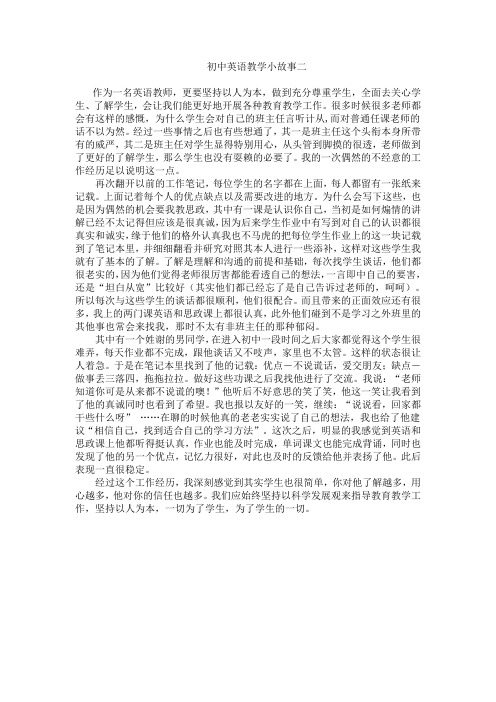
初中英语教学小故事二作为一名英语教师,更要坚持以人为本,做到充分尊重学生,全面去关心学生、了解学生,会让我们能更好地开展各种教育教学工作。
很多时候很多老师都会有这样的感慨,为什么学生会对自己的班主任言听计从,而对普通任课老师的话不以为然。
经过一些事情之后也有些想通了,其一是班主任这个头衔本身所带有的威严,其二是班主任对学生显得特别用心,从头管到脚摸的很透,老师做到了更好的了解学生,那么学生也没有耍赖的必要了。
我的一次偶然的不经意的工作经历足以说明这一点。
再次翻开以前的工作笔记,每位学生的名字都在上面,每人都留有一张纸来记载。
上面记着每个人的优点缺点以及需要改进的地方。
为什么会写下这些,也是因为偶然的机会要我教思政,其中有一课是认识你自己,当初是如何煽情的讲解已经不太记得但应该是很真诚,因为后来学生作业中有写到对自己的认识都很真实和诚实,缘于他们的格外认真我也不马虎的把每位学生作业上的这一块记载到了笔记本里,并细细翻看并研究对照其本人进行一些添补,这样对这些学生我就有了基本的了解。
了解是理解和沟通的前提和基础,每次找学生谈话,他们都很老实的,因为他们觉得老师很厉害都能看透自己的想法,一言即中自己的要害,还是“坦白从宽”比较好(其实他们都已经忘了是自己告诉过老师的,呵呵)。
所以每次与这些学生的谈话都很顺利,他们很配合。
而且带来的正面效应还有很多,我上的两门课英语和思政课上都很认真,此外他们碰到不是学习之外班里的其他事也常会来找我,那时不太有非班主任的那种郁闷。
其中有一个姓谢的男同学,在进入初中一段时间之后大家都觉得这个学生很难弄,每天作业都不完成,跟他谈话又不吱声,家里也不太管。
这样的状态很让人着急。
于是在笔记本里找到了他的记载:优点-不说谎话,爱交朋友;缺点-做事丢三落四,拖拖拉拉。
做好这些功课之后我找他进行了交流。
我说:“老师知道你可是从来都不说谎的噢!”他听后不好意思的笑了笑,他这一笑让我看到了他的真诚同时也看到了希望。
英语教师教育案例故事(2篇)

第1篇Once upon a time, in a small town named Greenfield, there was a primary school named Sunlight Primary School. Among the teachers of this school, there was a man named Mr. Smith, who was known as the most dedicated and passionate English teacher. However, there was a problem that Mr. Smith had been struggling with for years: his students were not interested in learning English.One day, during a routine English class, Mr. Smith decided to change his teaching methods to engage his students. He began by asking his students what they liked to do in their free time. To his surprise, most of them said they loved playing video games. Seeing this, Mr. Smith had an idea.He started incorporating video games into his English lessons. He would divide his students into groups and assign them a task: they had to create a short video game in English, using their own words and sentences. The students were excited and enthusiastic about this new approach to learning English. They spent hours discussing and brainstorming ideas for their video games.As the project progressed, Mr. Smith noticed that his students were becoming more confident in their English speaking and writing skills. They were no longer afraid of making mistakes, and they were eager to express themselves. The students also started helping each other, forming a strong sense of teamwork and cooperation.However, Mr. Smith faced a new challenge: some of his students were struggling with the technical aspects of creating a video game. To help them, Mr. Smith invited a local computer expert to come to the school and give a workshop on video game design. The students were fascinated by the workshop and learned a lot from the expert.After several weeks of hard work, the students finally completed their video games. They presented their games to the school's principal and other teachers, who were impressed by the students' creativity and dedication. The principal even organized a school-wide event to showcase the students' video games.The success of this project motivated Mr. Smith to continue exploring new teaching methods. He started using technology more frequently in his lessons, such as interactive whiteboards and educational apps. He also began to incorporate other subjects into his English classes, such as history, science, and art.One of Mr. Smith's students, Sarah, was particularly excited about this new approach to learning. "I never thought I could be good at English," Sarah said. "But now, I love it! I feel like I can express myself and share my ideas with others."Another student, John, also expressed his gratitude to Mr. Smith. "Mr. Smith is not just a teacher to us," John said. "He is a mentor and a friend. He has helped us discover our potential and believe in ourselves."As the years passed, Mr. Smith's students continued to excel in English and other subjects. They went on to attend prestigious universities and pursue their dreams. Many of them even credited Mr. Smith for their success, saying that he had inspired them to achieve greatness.In the end, Mr. Smith's journey of transformation as an English teacher was a success. He had not only improved his students' English skills but also helped them develop important life skills, such as teamwork, creativity, and self-confidence. His dedication and passion for teaching had a lasting impact on his students, and he will always be remembered as the teacher who made a difference in their lives.And so, the story of Mr. Smith, the English teacher, serves as an inspiration to all educators. It reminds us that with creativity, dedication, and a willingness to adapt, we can transform the lives of our students and help them achieve their full potential.第2篇Introduction:In the bustling city of Shanghai, China, there stood a public high school known for its rigorous academic standards and traditionalteaching methods. Among the teachers, Miss Wang, a dedicated and passionate English language instructor, was often seen challenging the status quo. Driven by her belief in student-centered learning, she embarked on a transformative journey to revolutionize her classroom. This is the story of how Miss Wang's innovative approach to teaching English led to a newfound love of learning among her students.The Challenge:Miss Wang's first year at the school had been a whirlwind of lectures, rote memorization, and test-driven evaluations. The students, burdened by the weight of their textbooks and the fear of failing exams, often found themselves disengaged and demotivated. Recognizing that this traditional approach was not fostering a love for the language, Miss Wang decided it was time for a change.The Turning Point:Inspired by the principles of inquiry-based learning, Miss Wang began to restructure her teaching methods. She replaced the monotonous lectures with interactive activities that encouraged students to explore and discover. The cornerstone of her new approach was the introduction of Socratic seminars, where students were prompted to ask questions, share their thoughts, and engage in thoughtful discussions.The First Seminar:The first Socratic seminar was nerve-wracking for both Miss Wang and her students. The topic was "The Role of Media in Society," and Miss Wang had chosen it to spark curiosity and critical thinking. She divided the class into small groups and provided each group with a set of guiding questions to guide their discussions.As the seminar progressed, Miss Wang watched in awe as her students began to engage with the material in ways she had never seen before. They asked insightful questions, debated passionately, and even offered personal anecdotes to support their arguments. The classroom buzzed with energy, and Miss Wang could see the transformation happening before her eyes.The Challenges:However, the journey was not without its challenges. Some students struggled to express their thoughts clearly, and others were hesitant to participate. Miss Wang realized that she needed to create a supportive and inclusive environment where every voice was valued. She encouraged peer-to-peer feedback and provided individualized support to those who needed it.The Rewards:As the weeks went by, Miss Wang noticed a remarkable change in her students. They were more engaged, curious, and confident. The fear of making mistakes had given way to a sense of empowerment, and the classroom had become a place of discovery and growth.One student, Li Wei, had been particularly reserved at the beginning of the semester. However, through the Socratic seminars, he found his voice and developed a newfound passion for English. He began to participate actively in discussions, and his writing improved significantly. In a letter to Miss Wang, Li Wei expressed his gratitude for her innovative teaching methods:"Miss Wang, your approach to teaching has changed my life. I never thought I could enjoy learning English, but now I look forward to every class. Thank you for giving me the confidence to express myself and for showing me that learning can be fun."The Impact:Miss Wang's transformational approach to teaching English had a ripple effect throughout the school. Other teachers began to observe her classes and incorporate inquiry-based learning into their own teaching. The school administration took notice of the positive impact and began to promote a culture of student-centered learning.Conclusion:Miss Wang's journey of discovery in her English classroom is a testament to the power of innovative teaching methods. By embracing inquiry-basedlearning and creating a supportive and inclusive environment, she was able to transform her students' lives and ignite a passion for learning that would last a lifetime. Her story serves as an inspiration to educators everywhere, reminding us that the key to effective teaching lies in fostering curiosity, encouraging participation, and nurturing the innate love for learning that resides in every student.。
初中英语教学故事

初中英语教学故事下面是店铺整理的初中英语教学故事,欢迎大家阅读!初中英语教学故事1 The Old Man and the Old CatAn old man has a cat. The cat is very old, too. He runs very quickly. And his teeth are bad. One evening, the old cat sees a little mouse. He catches it, but he can’t eat it because his teeth are not strong enough. The mouse runs away.The old man is very angry. He beats his cat. He says: “You are a fool cat. I will punish you!” the cat is very sad. He thinks:“When I was young, I worked hard for you. Now you don’t like me because I’m too old to work. You should know you are old, too.”初中英语教学故事2 Three Good FriendsOne day, a monkey rides his bike near the river. This time he sees a lion under a tree. The lion runs at him. He is afraid and falls into the river. He can’t swim. He shouts. The rabbit hears him. He jumps into the river. The rabbit swims to the monkey, but he can’t help him. Luckily, an elephant comes along. He is very strong. He helps the rabbit and monkey. Three friends are very happy. They go to the elephant’s home. Then, three of them become good friends.初中英语教学故事3 Spring in the Green SeasonSpring is coming. Spring is the first season of the year. In China, spring comes in February. It is still cold, but it is getting warmer and warmer. The days get longer and longer. The leaves on the trees begin to turn green. Then they come up green leaves in the spring wind on the ground. Spring is also sowing time season.初中英语教学故事4 Look for a FriendSam is a little fish. He lives in the sea. He is very lonely. He wants to have a friend. The friend looks like him. Sam sees an ink fish. The ink fish has eight legs. He doesn’t look like Sam. So Sam goes away. Sam meets a shark. He wants to say hello to the shark. The shark opens his big mouth. Sam runs away quickly. Sam is tired and hungry. He wants to have a rest. Then he sees a round fish. She says to him. “Hello! Would you like to be my friend?” Sam answers: “Of course! But you are round. I am flat.” The round fish days: “But we are both fishes.”Sam thinks and says, “You are right. Let’s be friends.” They become good friends.初中英语教学故事5 The Hippo(河马) and IA hippo lives in the zoo. I like him very much. I often go to see him. He often thinks of me, too. Today is Sunday. It is fine day.I go to see him again. After I leave the zoo, he follows me to my house. I give him lettuce, cabbages, bananas, apples and other food. He eats them up. When I sing songs, he stays in the pool. He is as quite as a rabbit.In the evening, he jumps onto my bed with me. My mum tells him to go home. He has to pack his bag and go back to the zoo. My mum lets me see him every week.初中英语教学故事6 Naughty MonkeyIt’s very hot.. An old man is asleep on the chair. A fly comes and sits on the end of the man’s nose.The old man has a naughty monkey. He chases(赶) the fly.The fly comes back again and sits on the old man’s nose again. The monkey chases it away again and again.This happens five or six times. The monkey is very angry. He jumps up, runs to the garden and picks up a large stone.When the fly sits on the old man’s nose again, the monkeyhits it hard with the stone.He kills the fly and breaks the old man’s nose.初中英语教学故事7 The Panda in ChinaA panda looks like a little bear. It has black and white fur. It lives only in China, so it is called the national treasure of China and protected by the law.We all see panda on TV or in the zoo. They look stupid and walk slowly, but they are lovely and everyone likes them.A panda is lucky animal. We Chinese like it, and people of the world like it, too. Now there are China’s pandas in many other countries, such as Japan and the USA…A panda isn’t a common animal, it is bridge of friendship.初中英语教学故事8 A Clever FarmerUncle Sam doesn’t like farmer. He thinks the y are very foolish and only know work on the farm.One winter morning, the sun is shining. Uncle Sam sits on the step of his house. At that moment,a farmer with a map in his hand comes to him.Farmer: Excuse me, Uncle. Can you tell me know to get to the hospital, please?Uncle Sam: Lie down in the middle of the street and you’ll soon be at a hospital.Farmer: Please set an example to me.Uncle Sam: I think you come to our city at the first time. It’s much more beautiful than the field. Is that right?Farmer: Yes, uncle. But it is built on the field.Uncle Sam’s face turns red.初中英语教学故事9 Where Is the Hat?Jack is a little goose. He has a lovely hat. He likes wearing it very much. But when he sits, his hat can’t stay on his head.He puts his hat down and begins to play game with the hat. When he gets tired of the game, things are not the same.He can’t find his hat. Where is it? Jack thinks hard. He looks up and down, and walks here and there. He can’t find his hat yet.At this time, his mother comes in. As soon as she sees Jack, she cries, “Oh, my dear! Don’t be foolish. Your hat is on your head.”Jack feels very foolish. He doesn’t want to wear his hat on his head.初中英语教学故事10 Two dogsA man has two dogs: a hound and a housedog. He trains the hound to help him hurt and teaches the housedog to watch the house. When he returns home after a day’s hunt, he always gives the house-dog some meat. The hound feels very angry. He says unhappily to the housedog, “Where I work very hard outside, you share my food.” “Don’t blame me, my friend. You should blame the master. He doesn’t teach me to hurt, but to share other’s food,” the housedog answers.Don’t blame children for the mistakes of their parent初中英语教学故事将本文的Word文档下载到电脑,方便收藏和打印推荐度:点击下载文档文档为doc格式。
初中英语教师师德教育故事
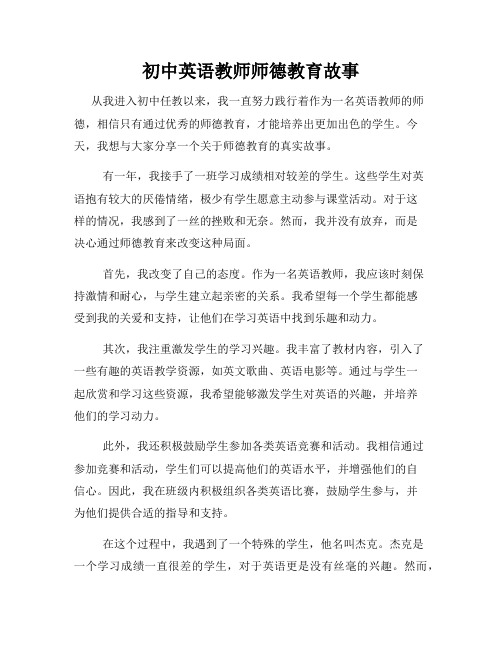
初中英语教师师德教育故事从我进入初中任教以来,我一直努力践行着作为一名英语教师的师德,相信只有通过优秀的师德教育,才能培养出更加出色的学生。
今天,我想与大家分享一个关于师德教育的真实故事。
有一年,我接手了一班学习成绩相对较差的学生。
这些学生对英语抱有较大的厌倦情绪,极少有学生愿意主动参与课堂活动。
对于这样的情况,我感到了一丝的挫败和无奈。
然而,我并没有放弃,而是决心通过师德教育来改变这种局面。
首先,我改变了自己的态度。
作为一名英语教师,我应该时刻保持激情和耐心,与学生建立起亲密的关系。
我希望每一个学生都能感受到我的关爱和支持,让他们在学习英语中找到乐趣和动力。
其次,我注重激发学生的学习兴趣。
我丰富了教材内容,引入了一些有趣的英语教学资源,如英文歌曲、英语电影等。
通过与学生一起欣赏和学习这些资源,我希望能够激发学生对英语的兴趣,并培养他们的学习动力。
此外,我还积极鼓励学生参加各类英语竞赛和活动。
我相信通过参加竞赛和活动,学生们可以提高他们的英语水平,并增强他们的自信心。
因此,我在班级内积极组织各类英语比赛,鼓励学生参与,并为他们提供合适的指导和支持。
在这个过程中,我遇到了一个特殊的学生,他名叫杰克。
杰克是一个学习成绩一直很差的学生,对于英语更是没有丝毫的兴趣。
然而,我并没有因此就对他放弃,而是请他在放学后每天去我的办公室,给他提供额外的辅导和关心。
杰克刚开始时并不情愿,觉得这是一种惩罚。
然而,随着时间的推移,他慢慢地发现了我的真诚和关心,并且逐渐对英语产生了兴趣。
每天放学后,他主动来到我的办公室,向我请教问题,并告诉我他学习英语的进步。
杰克开始在考试中取得了优异的成绩,这让我感到非常欣慰和骄傲。
通过这个故事,我深深地体会到了师德教育的力量。
作为一名初中英语教师,我们的责任不仅仅是传授知识,更是引导学生的成长和发展。
只有通过诚信、关爱和耐心,我们才能够真正地影响和激励学生们。
回顾这段经历,我深刻认识到,仅仅靠知识的灌输是远远不够的。
我的初中英语教学故事
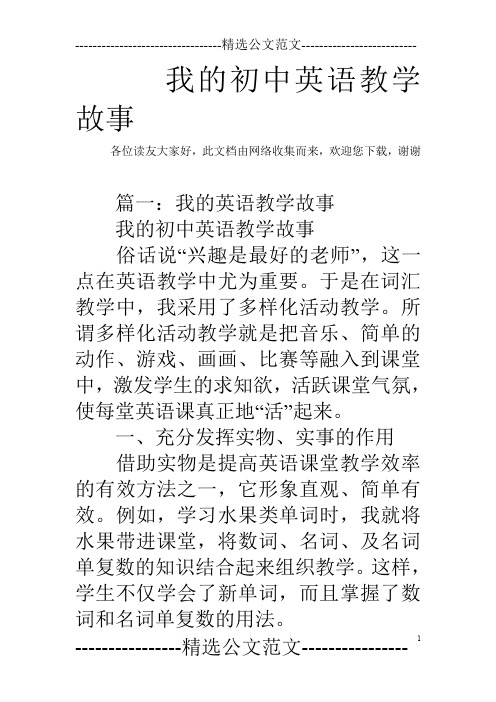
我的初中英语教学故事各位读友大家好,此文档由网络收集而来,欢迎您下载,谢谢篇一:我的英语教学故事我的初中英语教学故事俗话说“兴趣是最好的老师”,这一点在英语教学中尤为重要。
于是在词汇教学中,我采用了多样化活动教学。
所谓多样化活动教学就是把音乐、简单的动作、游戏、画画、比赛等融入到课堂中,激发学生的求知欲,活跃课堂气氛,使每堂英语课真正地“活”起来。
一、充分发挥实物、实事的作用借助实物是提高英语课堂教学效率的有效方法之一,它形象直观、简单有效。
例如,学习水果类单词时,我就将水果带进课堂,将数词、名词、及名词单复数的知识结合起来组织教学。
这样,学生不仅学会了新单词,而且掌握了数词和名词单复数的用法。
二、充分发挥游戏、表演的作用根据初中学生好玩的特点,把教学过程设计成游戏,指导学生边玩边学。
根据教学内容的内在要求,开展游戏,可以提高课堂教学效率。
例如:在身体部位eye,nose,ear,mouth,hand,face 等单词教学时,和学生一起做“Touch your head”游戏。
开始我先作示范,然后说Touch your nose. 学生边听边点自己的鼻子。
依次练习nose,ear,eye,mouth,hand,face;重复几遍之后再进行小组比赛;并加大难度,只有当学生听到Polly says “Touch your ears.”时,学生才可用手摸自己的耳朵,否则算违规,要被“罚”下场,游戏结束,小组违规最少者得胜。
整个活动由学生自愿轮流当发令官,学生参与的积极性很高。
游戏使枯燥的单词变生动了,难记的知识变容易了。
生动夸张的表演,欢乐愉快的情绪激发了学生兴趣和热情。
三、尽量发挥故事、笑话的作用初中是学习语言的最佳时期,但长时间学习会使兴趣逐渐减退,注意力逐渐分散。
教师可以充分发挥故事、笑话的作用提高教学效率。
例如:在教授词汇时,把七种颜色用在学生感兴趣的物体身上,编成一个有趣的故事。
四、及时复习,及时巩固要掌握词汇就要与遗忘作斗争。
初中英语老师教研故事(3篇)
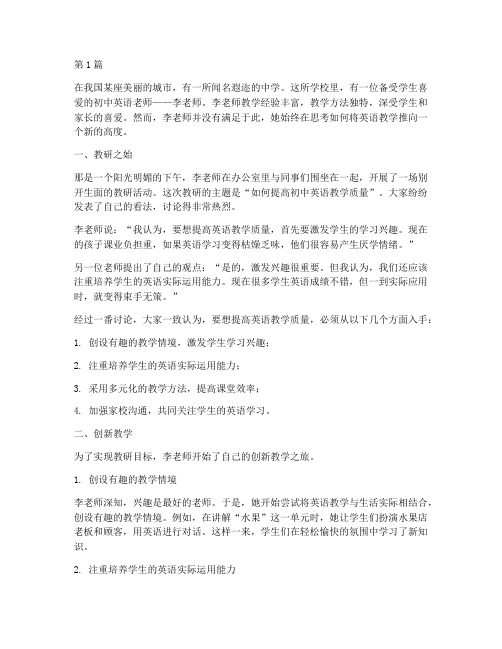
第1篇在我国某座美丽的城市,有一所闻名遐迩的中学。
这所学校里,有一位备受学生喜爱的初中英语老师——李老师。
李老师教学经验丰富,教学方法独特,深受学生和家长的喜爱。
然而,李老师并没有满足于此,她始终在思考如何将英语教学推向一个新的高度。
一、教研之始那是一个阳光明媚的下午,李老师在办公室里与同事们围坐在一起,开展了一场别开生面的教研活动。
这次教研的主题是“如何提高初中英语教学质量”。
大家纷纷发表了自己的看法,讨论得非常热烈。
李老师说:“我认为,要想提高英语教学质量,首先要激发学生的学习兴趣。
现在的孩子课业负担重,如果英语学习变得枯燥乏味,他们很容易产生厌学情绪。
”另一位老师提出了自己的观点:“是的,激发兴趣很重要。
但我认为,我们还应该注重培养学生的英语实际运用能力。
现在很多学生英语成绩不错,但一到实际应用时,就变得束手无策。
”经过一番讨论,大家一致认为,要想提高英语教学质量,必须从以下几个方面入手:1. 创设有趣的教学情境,激发学生学习兴趣;2. 注重培养学生的英语实际运用能力;3. 采用多元化的教学方法,提高课堂效率;4. 加强家校沟通,共同关注学生的英语学习。
二、创新教学为了实现教研目标,李老师开始了自己的创新教学之旅。
1. 创设有趣的教学情境李老师深知,兴趣是最好的老师。
于是,她开始尝试将英语教学与生活实际相结合,创设有趣的教学情境。
例如,在讲解“水果”这一单元时,她让学生们扮演水果店老板和顾客,用英语进行对话。
这样一来,学生们在轻松愉快的氛围中学习了新知识。
2. 注重培养学生的英语实际运用能力为了让学生在实际生活中运用英语,李老师鼓励学生们参加各类英语活动。
她组织学生参加英语角、英语演讲比赛等,让学生们在实践中提升自己的英语水平。
3. 采用多元化的教学方法李老师在课堂上采用了多种教学方法,如角色扮演、小组讨论、游戏等,让课堂变得更加生动有趣。
她还尝试使用多媒体技术,将图片、视频、音频等元素融入教学中,激发学生的学习兴趣。
初中英语教师师德教育故事
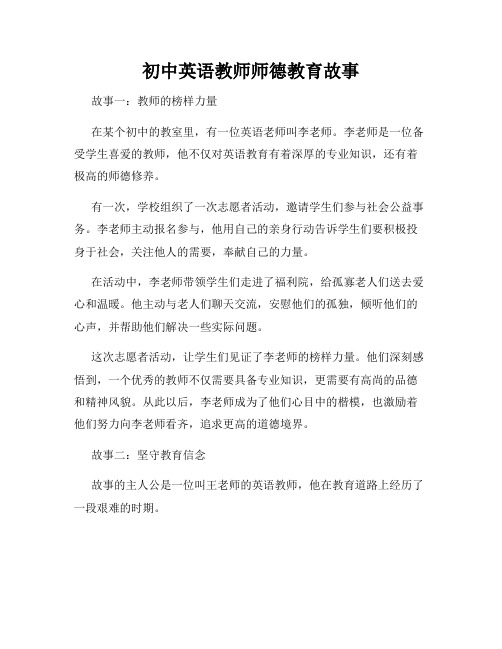
初中英语教师师德教育故事故事一:教师的榜样力量在某个初中的教室里,有一位英语老师叫李老师。
李老师是一位备受学生喜爱的教师,他不仅对英语教育有着深厚的专业知识,还有着极高的师德修养。
有一次,学校组织了一次志愿者活动,邀请学生们参与社会公益事务。
李老师主动报名参与,他用自己的亲身行动告诉学生们要积极投身于社会,关注他人的需要,奉献自己的力量。
在活动中,李老师带领学生们走进了福利院,给孤寡老人们送去爱心和温暖。
他主动与老人们聊天交流,安慰他们的孤独,倾听他们的心声,并帮助他们解决一些实际问题。
这次志愿者活动,让学生们见证了李老师的榜样力量。
他们深刻感悟到,一个优秀的教师不仅需要具备专业知识,更需要有高尚的品德和精神风貌。
从此以后,李老师成为了他们心目中的楷模,也激励着他们努力向李老师看齐,追求更高的道德境界。
故事二:坚守教育信念故事的主人公是一位叫王老师的英语教师,他在教育道路上经历了一段艰难的时期。
起初,王老师对教育充满激情,兢兢业业,用心教学,努力培养学生的英语能力。
然而,由于学校环境的压力和学生学习兴趣的低迷,王老师逐渐感到疲惫和迷茫。
一天,王老师偶然看到一位教育界的先行者的讲座视频。
这位先行者用自己的亲身经历和心血来告诉王老师教育的真谛。
他说,教师的价值不仅仅在于学生的学习成绩,更在于学生的全面发展和品德素养的培养。
这位先行者的话触动了王老师的内心深处。
他决心重新审视自己的教育信念,并坚守初衷。
他积极参加各类教育研讨会,提升自己的教育水平。
同时,他也鼓励学生们参加各类英语竞赛和活动,用真实的成绩证明自己的综合素养。
王老师的付出没有白费,他的学生们在他的影响下逐渐展露出潜力,取得了优异的成绩。
王老师也在学校和社区中树立起了崇高的声誉。
他的坚守和信念影响着周围的人,成为许多教育工作者的榜样。
故事三:宽容与关爱另一位初中英语教师叫张老师,他以宽容和关爱闻名于校园。
张老师教学有方,注重培养学生的英语实际运用能力,但他更注重培养学生的人格和道德修养。
初中英语教师教育教学故事

初中英语教师教育教学故事Teaching English to middle school students can be a challenging yet immensely rewarding experience. As an English teacher, I have had the privilege of guiding young minds through the complexities of the language, fostering their love for literature, and watching them grow in their communication skills. One particular story from my teaching journey stands out as a testament to the transformative power of education.It was my first year teaching at a local middle school, and I was eager to make a lasting impact on my students. One student, in particular, caught my attention - let's call him Alex. Alex was a quiet, reserved boy who often kept to himself during class. He struggled with the basic concepts of English grammar and seemed disinterested in the subject matter. I knew that reaching him would be a delicate balancing act, requiring patience, empathy, and a deep understanding of his unique needs.I began by observing Alex closely, trying to understand his learning style and the challenges he faced. It became clear that the traditionallecture-based approach was not resonating with him. He needed a more hands-on, interactive learning experience that would engage his senses and spark his curiosity.Determined to unlock Alex's potential, I decided to try a different approach. I started incorporating more group activities and collaborative projects into my lessons, encouraging Alex to work with his peers and contribute to the discussions. At first, he was hesitant and withdrawn, but slowly, I began to see a change in his demeanor.As the weeks passed, Alex's confidence started to grow. He would raise his hand more often, volunteering answers and sharing his insights with the class. I made a conscious effort to praise his efforts, no matter how small, and to provide him with targeted feedback that would help him improve.One day, during a lesson on creative writing, I challenged the class to write a short story. To my delight, Alex approached me after class, clutching a neatly written piece in his hand. He shyly asked if I would be willing to read it and provide feedback. I eagerly accepted, and as I read through his story, I was struck by the depth of his imagination and the eloquence of his prose.From that moment on, Alex's transformation was nothing short of remarkable. He began to excel in his English studies, participatingactively in class discussions and consistently producing high-quality work. His newfound confidence spilled over into other subjects as well, and his teachers reported a marked improvement in his overall academic performance.What made this story so special was not just the academic progress Alex achieved, but the profound personal growth he experienced. Through our one-on-one interactions and the nurturing environment I tried to create in the classroom, Alex learned to believe in himself and to see the value in his own unique perspectives and abilities.As an educator, moments like these remind me of the profound impact we can have on the lives of our students. It's not just about imparting knowledge; it's about empowering young people to unlock their full potential, to find their voice, and to navigate the complexities of the world with confidence and resilience.The story of Alex's journey is a testament to the power of personalized learning, the importance of fostering a supportive and inclusive classroom environment, and the transformative potential of education. It's a reminder that every student is unique, with their own strengths, challenges, and learning needs, and that as teachers, we must be willing to adapt our approaches to meet the diverse needs of our students.In the end, the most rewarding aspect of this story is not the academic success Alex achieved, but the personal growth and self-discovery he experienced. By nurturing his talents and believing in his abilities, I was able to help him unlock a part of himself that he had never before recognized. And that, to me, is the true essence of teaching – to inspire, to empower, and to help our students become the best versions of themselves.。
我的初中英语教学故事
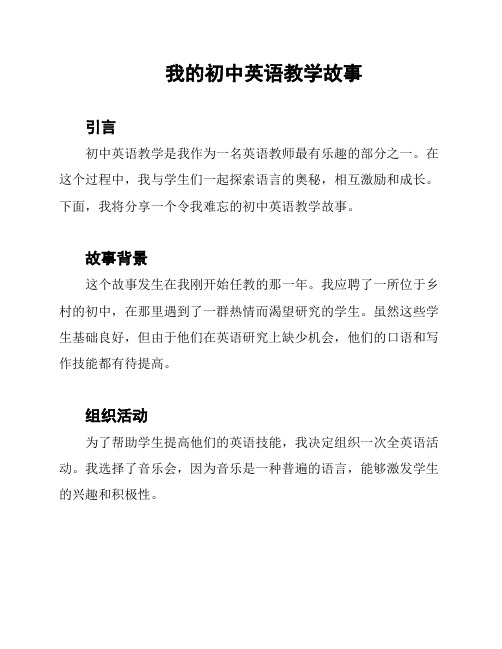
我的初中英语教学故事引言初中英语教学是我作为一名英语教师最有乐趣的部分之一。
在这个过程中,我与学生们一起探索语言的奥秘,相互激励和成长。
下面,我将分享一个令我难忘的初中英语教学故事。
故事背景这个故事发生在我刚开始任教的那一年。
我应聘了一所位于乡村的初中,在那里遇到了一群热情而渴望研究的学生。
虽然这些学生基础良好,但由于他们在英语研究上缺少机会,他们的口语和写作技能都有待提高。
组织活动为了帮助学生提高他们的英语技能,我决定组织一次全英语活动。
我选择了音乐会,因为音乐是一种普遍的语言,能够激发学生的兴趣和积极性。
为了做好准备,我和学生们一起选择了一些流行的英语歌曲,并在课堂上进行了反复练。
学生们分成小组,每个小组负责表演一首歌曲。
他们需要背诵歌词,练发音,并在音乐会上展示出来。
音乐会的准备在多次的练和排练后,我们终于迎来了音乐会。
学生们用自己独特的方式制作了海报和道具,并穿上了漂亮的服装。
他们通过扮演角色和模仿明星的动作,让整个音乐会充满了欢笑和活力。
音乐会的成功音乐会的当天,学生们充满自信地走上舞台,用流利的英语唱出了自己的歌曲。
他们发挥出色,展示了他们在英语研究方面的进步。
不仅如此,音乐会也为学生们提供了展示自己才能的机会。
一些学生表演了自己的舞蹈,有些学生还演奏了乐器。
整个音乐会充满了激情和欢乐,让学生们充分展示了自己的多元才艺。
教学反思通过这次音乐会活动,我深刻地认识到了学生们的潜力和他们无限的能力。
他们愿意用英语来表达自己,勇于展示自己的才艺。
这次活动不仅提高了学生们的英语技能,还增强了他们的自信心和合作能力。
我也从中学到了很多。
我意识到教学不仅仅是传授知识,更是激发学生们的激情和兴趣。
通过创造性的教学方法,我能够激发学生的研究动力,并帮助他们充分发挥自己的潜力。
结论这个初中英语教学故事让我明白了教育的力量和教师的使命。
通过创造性的教学方法,我能够激发学生的激情和兴趣,并帮助他们实现自己的梦想。
英语老师教育案例中学(3篇)

第1篇IntroductionIn the field of education, a teacher's role is not just to impart knowledge but also to inspire, motivate, and guide students throughtheir learning journey. This case study focuses on the experiences of an English teacher, Miss Liu, in her middle school classroom. Miss Liu has been teaching English for five years and has a passion for helping her students develop not only their language skills but also their critical thinking and cultural awareness. The case study will explore a specific teaching moment, the challenges faced by Miss Liu, and the strategiesshe employed to effectively educate her students.BackgroundMiss Liu teaches a group of 30 middle school students in a public school in a suburban area. The students come from diverse backgrounds, with some having a strong foundation in English and others struggling with basic grammar and vocabulary. The school's curriculum emphasizes both language proficiency and cultural understanding, and Miss Liu is tasked with ensuring that her students meet these objectives.The Teaching MomentThe teaching moment in question occurred during a unit on "Global Issues." Miss Liu had assigned a group project where students were required to research a global issue, such as climate change, poverty, or human rights, and present their findings to the class. This project was designed to enhance students' research skills, public speaking abilities, and understanding of global issues.The ChallengeMiss Liu faced several challenges during this project:1. Diverse Learning Levels: The class had a wide range of abilities, and Miss Liu needed to find a way to support both the advanced students who were eager to delve deeper into their research and the struggling students who needed more guidance.2. Limited Resources: The school had limited access to online resources, and Miss Liu had to rely on books and other printed materials for her students' research.3. Time Constraints: The project was due in two weeks, and Miss Liu had to manage her time effectively to ensure that all students had enough time to complete their research and presentations.Strategies Employed by Miss LiuTo address these challenges, Miss Liu employed a variety of strategies:1. Differentiated Instruction: Miss Liu created a tiered assignment for the project, with different levels of difficulty. Advanced students were given more complex research tasks, while struggling students were encouraged to focus on basic research skills and presentation techniques.2. Collaborative Learning: Miss Liu encouraged students to work in groups, pairing advanced students with struggling ones. This not only helped the struggling students but also allowed the advanced students to practice their leadership and teamwork skills.3. Regular Check-ins: Miss Liu scheduled regular check-ins with each group to monitor their progress and provide feedback. This allowed her to identify any issues early on and offer targeted support.4. Resource Sharing: Miss Liu shared her own research materials with the students and encouraged them to share their findings with each other. This helped to maximize the use of limited resources.5. Time Management Techniques: Miss Liu taught her students time management techniques, such as creating timelines and setting daily goals, to help them stay on track with their project.The OutcomeThe project was a resounding success. The students presented a wide range of topics, and their presentations were well-received by boththeir peers and Miss Liu. The advanced students were able to demonstrate their in-depth knowledge of their chosen topics, while the strugglingstudents showed significant improvement in their research and presentation skills.ReflectionMiss Liu reflected on the experience, noting that the project not only helped her students learn about global issues but also taught them valuable life skills such as teamwork, time management, and critical thinking. She also acknowledged the challenges of teaching a diverse class and the importance of adapting her teaching methods to meet the needs of all her students.ConclusionThis case study highlights the importance of a teacher's ability to adapt to the needs of their students and employ effective teaching strategies. Miss Liu's approach to the "Global Issues" project demonstrates her commitment to her students' success and her ability to create a supportive and engaging learning environment. By addressing the challenges she faced and implementing innovative strategies, Miss Liu was able to help her students achieve their academic goals and develop valuable life skills.第2篇IntroductionThe role of a teacher in shaping a student's educational journey is indispensable. Among various subjects, English plays a crucial role in fostering communication skills, cultural understanding, and critical thinking. This case study explores the impact of an English teacher on a group of middle school students, highlighting the strategies employed, challenges faced, and the transformative effect on the students' learning and language proficiency.BackgroundThe case study focuses on a middle school located in a suburban area, with a diverse student population. The English teacher, Mrs. Johnson, had been teaching at the school for five years. She was known for herenthusiasm, creativity, and dedication to her students. The class consisted of 25 students, ranging from 12 to 14 years old, with varying levels of English proficiency.Teaching Strategies1. Engagement through Technology: Mrs. Johnson utilized various digital tools such as educational apps, online platforms, and interactive whiteboards to make the learning process more engaging. For instance, she used Quizlet to create flashcards and games that helped students memorize vocabulary more effectively.2. Differentiated Instruction: Recognizing that students had different learning styles and abilities, Mrs. Johnson employed differentiated instruction. She provided additional support to students who struggled with grammar and reading, while challenging advanced students with more complex texts and projects.3. Project-Based Learning: Mrs. Johnson often incorporated project-based learning activities into her lessons. For example, students were required to research a famous author and create a presentation, which not only enhanced their research skills but also improved their public speaking abilities.4. Collaborative Learning: Group work was a staple in Mrs. Johnson's classroom. She encouraged students to work together on tasks, fostering teamwork and communication skills. This approach also allowed students to learn from each other's strengths and weaknesses.5. Cultural Exchange: Mrs. Johnson believed in the importance ofcultural exchange. She organized cultural days where students shared stories, traditions, and foods from their respective countries,fostering a sense of unity and understanding.Challenges and Solutions1. Student Motivation: Some students were initially unmotivated to learn English, viewing it as a subject with no practical application. Mrs. Johnson addressed this challenge by connecting the subject to real-lifescenarios and emphasizing the importance of English in the globalized world.2. Language Barriers: As the class had students from diverse linguistic backgrounds, Mrs. Johnson faced the challenge of language barriers. She overcame this by using simple language, visual aids, and incorporating sign language when necessary.3. Behavioral Issues: One student, in particular, exhibited disruptive behavior during class. Mrs. Johnson addressed this issue by having aone-on-one conversation with the student, understanding the root cause of their behavior, and implementing strategies such as positive reinforcement and individualized attention.Impact on Student Learning1. Improved Language Proficiency: Over the course of the school year, students showed significant improvement in their language proficiency. Their vocabulary expanded, grammar usage improved, and reading comprehension skills enhanced.2. Increased Engagement: The use of technology, project-based learning, and collaborative activities made the learning process more engaging for students, leading to higher participation rates and overall satisfaction.3. Cultural Awareness: The cultural exchange activities not only helped students appreciate diverse cultures but also improved their understanding of global issues and perspectives.4. Self-Esteem and Confidence: As students improved their languageskills and felt more engaged in the classroom, their self-esteem and confidence grew. They became more proactive in participating in discussions and presenting their ideas.ConclusionMrs. Johnson's dedication and innovative teaching strategies had a profound impact on her students' learning and language proficiency. The case study highlights the importance of engaging, differentiated instruction, and a supportive classroom environment in fostering studentsuccess. As educators, it is crucial to adapt our teaching methods to meet the diverse needs of students, creating a conducive atmosphere for learning and personal growth.第3篇Introduction:As an English teacher, I have had the privilege of witnessing and guiding the learning journeys of numerous students. One particular student, let's call him Alex, stands out in my memory due to the challenges he faced and the remarkable progress he made under my guidance. This case study explores the strategies I employed to transform Alex's English learning journey and the lessons learned from the experience.Background:Alex was a 15-year-old student who joined my class halfway through the academic year. He had been struggling with English for years, and his lack of confidence was evident in his hesitant participation in class discussions and his poor performance in written assignments. His parents were concerned about his progress, and they sought help from me to improve his English skills.Initial Assessment:During the initial assessment, I observed that Alex had a basic understanding of English grammar and vocabulary but lacked the fluency and confidence needed to express himself effectively. He was also hesitant to engage with the material, often relying on rote memorization rather than critical thinking and application.Teaching Strategy:To address Alex's challenges, I adopted a multi-faceted teaching strategy that focused on building his confidence, enhancing his language skills, and encouraging his engagement with the subject matter. Here are the key components of my approach:1. One-on-One Interaction:I scheduled regular one-on-one sessions with Alex to provide personalized attention and support. During these sessions, we worked on specific areas of weakness, such as grammar, vocabulary, and pronunciation. This helped me understand his learning style and tailor my teaching methods accordingly.2. Engaging and Interactive Lessons:I designed interactive lessons that encouraged student participation. This included group discussions, role-playing exercises, and games that made learning enjoyable and less intimidating for Alex. By involving him in various activities, I aimed to boost his confidence and make the learning process more engaging.3. Individualized Learning Plans:To address Alex's specific needs, I created individualized learning plans. These plans included targeted exercises and resources that helped him practice and reinforce the concepts we covered in class. The plans were flexible, allowing Alex to progress at his own pace and focus on areas that required more attention.4. Positive Reinforcement:I made it a point to acknowledge and praise Alex's progress, no matter how small. Positive reinforcement is a powerful tool in motivating students, and I used it extensively to encourage Alex to continue working towards his goals.5. Collaboration with Parents:I maintained regular communication with Alex's parents, sharing updates on his progress and discussing strategies to support his learning at home. This collaboration was crucial in ensuring a consistent learning environment for Alex.Results:Over the course of the academic year, Alex's English skills improved significantly. His confidence grew, and he became more engaged in class discussions. Here are some of the key improvements:- Improved grammar and vocabulary usage: Alex's written and spoken English became more grammatically correct, and his vocabulary expanded significantly.- Enhanced fluency: Through regular practice and interactive activities, Alex's pronunciation and fluency improved, making it easier for him to communicate effectively.- Increased participation: Alex became more willing to participate in class discussions and group activities, contributing his thoughts and ideas.- Positive attitude: Alex's overall attitude towards English improved, and he became more open to learning and challenging himself.Conclusion:The journey of transforming Alex's English learning experience was a testament to the power of personalized attention, engaging teaching methods, and consistent support. By adopting a multi-faceted approach and focusing on building Alex's confidence and skills, I was able to help him overcome his challenges and achieve remarkable progress. This experience has taught me the importance of adapting my teaching methods to meet the individual needs of students and the value of persistence and patience in guiding their learning journeys.。
【中学英语教师资格 阅读理解】初中英语教学故事
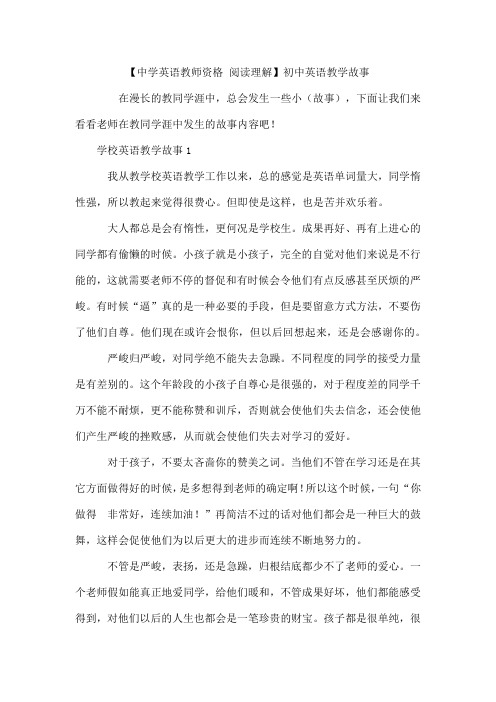
【中学英语教师资格阅读理解】初中英语教学故事在漫长的教同学涯中,总会发生一些小(故事),下面让我们来看看老师在教同学涯中发生的故事内容吧!学校英语教学故事1我从教学校英语教学工作以来,总的感觉是英语单词量大,同学惰性强,所以教起来觉得很费心。
但即使是这样,也是苦并欢乐着。
大人都总是会有惰性,更何况是学校生。
成果再好、再有上进心的同学都有偷懒的时候。
小孩子就是小孩子,完全的自觉对他们来说是不行能的,这就需要老师不停的督促和有时候会令他们有点反感甚至厌烦的严峻。
有时候“逼”真的是一种必要的手段,但是要留意方式方法,不要伤了他们自尊。
他们现在或许会恨你,但以后回想起来,还是会感谢你的。
严峻归严峻,对同学绝不能失去急躁。
不同程度的同学的接受力量是有差别的。
这个年龄段的小孩子自尊心是很强的,对于程度差的同学千万不能不耐烦,更不能称赞和训斥,否则就会使他们失去信念,还会使他们产生严峻的挫败感,从而就会使他们失去对学习的爱好。
对于孩子,不要太吝啬你的赞美之词。
当他们不管在学习还是在其它方面做得好的时候,是多想得到老师的确定啊!所以这个时候,一句“你做得非常好,连续加油!”再简洁不过的话对他们都会是一种巨大的鼓舞,这样会促使他们为以后更大的进步而连续不断地努力的。
不管是严峻,表扬,还是急躁,归根结底都少不了老师的爱心。
一个老师假如能真正地爱同学,给他们暖和,不管成果好坏,他们都能感受得到,对他们以后的人生也都会是一笔珍贵的财宝。
孩子都是很单纯,很和善的,谁好谁不好,他们都知道的。
不为他们将来会对你有什么回报,只为能问心无愧。
记得我曾经教过的第一届同学,现在已经大部分都成家立业了,我印象很深刻。
那是我刚参与工作不久,教学的热忱非常身高涨,很喜爱和同学们打成一片,虽然我曾听过有老老师对我进行了善意的提示:新老师最好是不要和同学走得太近,否则可能会在日后管不住他们,上课纪律可能会出问题。
但我还是坚持做他们的好伴侣,和他们谈心,甚至开开玩笑,当然我成了他们受欢迎的老师。
初中英语教师师德教育故事

初中英语教师师德教育故事
有一个初中英语教师叫李老师,他非常注重师德教育,关注学生的全面发展。
有一天,他发现班上有两个学生之间存在着矛盾和冲突,影响了学习气氛。
李老师决定采取行动解决这个问题。
他先单独找到这两个学生进行了一次谈话,了解了他们之间的矛盾原因。
然后,他在课堂上专门组织了一次班会,让大家表达自己的观点和想法,并引导大家互相理解和包容。
为了帮助学生建立良好的人际关系,李老师还安排了一些团队合作的活动,让学生们通过合作解决问题,增强彼此之间的信任和团结。
在平时的教学中,李老师注意鼓励每个学生,注重引导学生树立正确的价值观和道德观。
他经常告诉学生,做一个有责任心、有担当的人,要学会尊重他人,关心他人,并用心去帮助他人。
通过这些努力,班级的氛围变得更加和谐友好,学生之间的关系明显改善,大家更加愿意向李老师寻求帮助和倾诉。
这个故事告诉我们,作为一名优秀的教师,不仅要关注学生的学习成绩,更要注重师德教育,引导学生正确面对问题和解决问题,培养学生的品德和人格,为他们的未来发展打下坚实的基础。
- 1、下载文档前请自行甄别文档内容的完整性,平台不提供额外的编辑、内容补充、找答案等附加服务。
- 2、"仅部分预览"的文档,不可在线预览部分如存在完整性等问题,可反馈申请退款(可完整预览的文档不适用该条件!)。
- 3、如文档侵犯您的权益,请联系客服反馈,我们会尽快为您处理(人工客服工作时间:9:00-18:30)。
初中英语教师教育故事2篇
初中英语教师教育故事 1
我从事初中英语教学已近20年了,一直以来都是一位平凡的教
师工作在教学的前沿。
在这么的年来的教学中,我一直都在兢兢业业的对待自己的教学工作。
但面临现在新的形势下的教学我发现再用以
前的教学方法已经效果甚微。
在学习了新课改之后我也试着用新的教
学形势方法去改进自己的教学。
我运用做多的是小组合作学习。
我把学生就近原则分成一组,在课堂教学中以小组形势练习对话,做游戏,尤其在单词的检查这一环节中,分小组起了很大的作用,小组组长检查督促小组成员,以小组比赛的形势看谁背的又快又正确,既涉及个体又与集体有关,效果很好。
但在我们运用中应注意以下的几个问题。
1、处理好集体教学与小组合作学习的时间分配。
在目前的英语
教学实践中,只有把合作学习与集体教学有效结合在一起,才更有助于提高英语课堂学习的效率,人数较多的班级,处理好二者之间的时间分配关系尤为重要。
在课堂教学过程中,教师须根据所教的内容,
对小组学习和集体教学所需要的时间进行科学有效地合理分配。
2、教师应明确合作学习的任务。
刚展开小组合作学习时,在课
堂上常会出现学生因不清楚要干什么而乱作一团的局面,这会令教师措手不及。
因此,每次展开小组合作学习时,教师首先要提出明确的
任务和要求,让学生围绕某一主题展开合作。
教师所提的要求要有梯
度,在学生还没有完全适应小组合作学习这种形式时,不要提太高的要求,要随着学生合作技能的熟练,逐渐增加要求。
3、引进竞争机制和激励性评价。
小组合作学习对于组内成员来说,是他们之间的合作,但对于组与组之间来说,还必须有竞争。
只
有建立“组内是合作,组间有竞争”的机制,才能更好地发挥合作学习的功效。
对于表现好的小组,教师要及时给予鼓励和表扬,激发他们
参与合作学习的热情。
4、注意培养学生的合作意识与合作能力。
合作学习被引进英语
课堂教学,究其原因也是为了适应社会对人才的需要,适应英语这门语言学习的需要。
学生在课堂学习中掌握了合作技巧,除了可以提高英语学习的效率之外,还可以增强他们与人交往的能力。
教师在教学中要为学生创设多种机会,有意识地培养他们的合作意识与技能。
小组合作学习模式在英语教学中运用的空间是非常广泛的,具有较好的应用价值,它为每位学生参与学习提供良好的教学氛围,为发展学生的合作品质、提高学生的综合素质以及终身学习的能力打下坚
实的基础。
我相信英语教学中的小组合作学习模式将会随着我们在教
学实践中的运用而不断发展完善。
初中英语教师教育故事 2
如这个学校是以农村学生为主的,少数学生在学习上是存在一定困难的,包括他们的学习基础和学习方法,还有对英语学习的重视程度上,都有一定的偏差,使得班级的整体英语都不高,学生的英语水
平也参差不齐。
在教学过程中,我发现这个年级的孩子的自尊心是比
较重的,当然在孩子的成长过程中,也没有比自尊心更重要的了。
在
学习过程中,既要保护学生的自尊心,又要尽快提高学生的英语水平,这就要求教师善于通过鼓励来帮助学生建立积极的心态,建立对自己的自信心,“老师相信你可以做到的!”这也是我对学生说的最多的话中的一句。
尽量把外力变为内力,把“要我学”变为“我要学”,提高学习兴趣,提高学习效率,这样学生就能不停地前进,取得意想不到的
可喜成绩。
在这个过程中,我所经历的一件事也让我坚定这一信念。
今年我接了八(1)班的英语教学工作。
接手班级的时候就知道
这届的学生基础不好,有些甚至是学习差行为差的“双差生”,这就造成“差生”与“好生”的成绩差距相当大,有很多的学生在通过小学的四
年英语学习后甚至连26个字母都没有背全。
在英语学习中存在很大
的困难,懒于学习又不能及时完成作业,有的勉强完成作业,质量也
不高。
让他们回去做背单词类似的作业就索性当成没作业。
对于他们,我除了采取一些适合他们特点的教学方法外,主要还是从“心”上着手,对他们经常采取鼓励,表扬的方式,尽可能多的给他们帮助让他
们树立自信,放大他们的优点,从而使他们在学习成绩上逐渐提高。
开学近两个月,学校进行了月考。
有一天晚自修时,我找来一个英语
基础较薄弱的学生,在走廊上问他:月末的考试你打算考多少分呀?他很自信地回答说:“我想考75分!”因为他的基础太差,又经常不
按时完成作业,以前考过的成绩也从未超过65分。
所以当听到他有这样的想法之后.我很高兴地点了点头。
刚想开口表扬他的目标时,
只听到走过的同班同学,带着嘲笑的口气说:“他还能考上70多分?
别到时不及格就行了!老师别相信他。
”周围的同学也都跟着笑了起来。
当时就看这个学生的脸唰的红了,想反驳,最后却把头深深地埋
了下去。
看着学生难过的样子,我的心也跟着纠结了起来,他的样子
让我的心在一瞬间好像也受到了严重的伤害,难过起来。
那位学生当时那自卑窘迫的样子至今都好像仍在我眼前。
但是我赶紧微笑着摸着他的头说:“同学们都不相信你能考上70多分,但老师相信你可以的!争气,努力,有什么不懂的马上问,月考的时候考个好成绩来向大家
证明,你是个聪明的孩子,求上进的学生,好吗?”他抬起头红着眼眶狠狠地点着头说:“嗯。
老师,我一定能考及格的!”从那天起,他每天都会把当天我上课的内容在笔记本上整理好交给我,让我帮助纠正其中的错误,作业的质量也高了很多。
看着他的努力我很高兴,也
更坚信他能考出一个好成绩,果然月考的时候他考了82分,所有的同学都对他刮目相看,他自己学习的积极性也提高了不少,同时也在一定的程度上带动了班级里后进生的学习积极性。
现在整个班级的英语学习的氛围比开学时浓厚了很多,总体成绩也提高了不少,相信更大的进步在前面等着他们。
在初二的日常教学,我渐渐发现学生们对阅读课的兴趣不再象初一时那样浓厚了,其间经常会有学生溜号或忙于做题。
这使我开始有了进一步的思考。
在多年的教学中,我一直认为兴趣是学好语言的强劲动力和能力形成的前提,我一直在教学中实践着努力培养学生的学习热情,包括平时大家都认为比较枯燥的语法。
在阅读教学中,我也
发现,只有使学生对所学的阅读材料产生兴趣,才能调动他们的积极
性。
学生有了学习的积极性,才会主动参与到阅读训练中,从而提高
教学效率,最终达到最佳的教学效果。
语言学家、心理学家的研究也
表明,文化背景知识在阅读训练中起着非常重要的作用。
可见,在做
阅读练习前,适当介绍一些与课文相关的背景知识,会更加有助于学生对阅读材料的理解。
因此,在接下来的一个阅读材料中,为了提高
学生对所学材料的兴趣,我进行了精心的设计,我首先在黑板上呈现
并向学生出示了以下讨论题:How much 该课标题“living with disease”,
do you know about disease? 要求学生根据题目进行小组讨论,预测一下本文将会谈到些什么,然后,我将课前准备好的有关disease的图片一一向学生呈现,从而使学生接触到一些具体disease的素材,为接下来的阅读训练做好铺垫。
在阅读过程中,我将翻录到电脑上的录音进行播放,同时在电脑屏幕上相应呈现图像剪辑,使学生不仅在听觉,而且在视觉上都能受到刺激,加深对阅读材料的理解。
由于阅读训练的目的是要尽力抓住主
要内容,而不是细枝末节,因此,我并不要求学生把每个词、每句话
都听懂,而是要求他们首先从整体上把握。
我把这个步骤分为两步:
首先,播放整篇阅读材料,要求学生尽力抓住主要内容,同时在听的
过程中将这些内容与自己听前所做的预测进行比较,从而达到进一步理解的效果。
听完后完成相应的练习。
其次,进行逐段播放,在每段
结束时留出1~2分钟的时间给学生思考,并要求他们完成第二和第
三大题。
如此一来,既给了全班学生充分的时间进行单独答题;又避。
